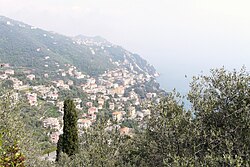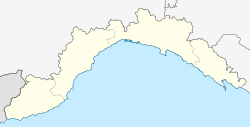
The Italian Riviera or Ligurian Riviera is the narrow coastal strip in Italy which lies between the Ligurian Sea and the mountain chain formed by the Maritime Alps and the Apennines. Longitudinally it extends from the border with France and the French Riviera near Ventimiglia eastwards to Capo Corvo which marks the eastern end of the Gulf of La Spezia and is close to the regional border between Liguria and Tuscany. The Italian Riviera thus includes nearly all of the coastline of Liguria. Historically the "Riviera" extended further to the west, through what is now French territory as far as Marseille.

Rapallo is a comune (municipality) in the Metropolitan City of Genoa, in the Italian region of Liguria.

Sestri Levante is a town and comune in the Metropolitan City of Genoa, Liguria, Italy. Lying on the Mediterranean Sea, it is approximately 40 km south-east of Genoa and is set on a promontory. While nearby Portofino and the Cinque Terre are probably the best-known tourist destinations on the Italian Riviera, Sestri Levante has become popular among Italians. This once quiet fishing village has slowly turned into a tourist hotspot, developing an old and a new town. The people of Sestri Levante often use the expression: "Sestri è scialla". This expression symbolizes the quiet nature of the city of Sestri Levante, known for its stunning views.

Pontecurone is a comune (municipality) in the Province of Alessandria in the Italian region Piedmont, located on the left bank of the Curone, about 100 kilometres (62 mi) east of Turin and about 25 kilometres (16 mi) east of Alessandria.
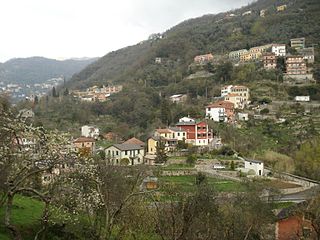
Avegno is a comune (municipality) in the Metropolitan City of Genoa in the Italian region of Liguria, located about 20 kilometres (12 mi) east of Genoa.

Bogliasco is a comune (municipality) in the Metropolitan City of Genoa in the Italian region Liguria, located about 11 kilometres (7 mi) southeast of Genoa. Together with the comuni of Camogli, Recco, Pieve Ligure and Sori, it is part of the so-called Golfo Paradiso. Economy is mostly based on tourism; agriculture include production of olives.

Campomorone is a comune (municipality) in the Metropolitan City of Genoa in the Italian region Liguria, located about 10 kilometres (6 mi) north of Genoa.
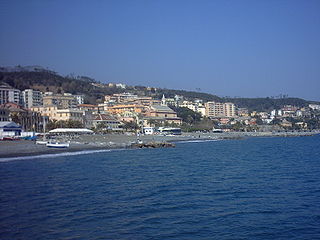
Cogoleto is a comune (municipality) in the Metropolitan City of Genoa in the Italian region Liguria, located about 25 kilometres (16 mi) west of Genova. Its territory extends from the sea to the Ligurian Apennines; it is part of the Natural Regional Park of Monte Beigua.
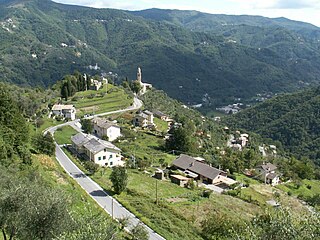
Coreglia Ligure is a comune (municipality) in the Metropolitan City of Genoa in the Italian region Liguria, located about 25 kilometres (16 mi) east of Genoa.

Moconesi is a municipality (comune) in the Metropolitan City of Genoa in the Italian region Liguria. The head-hamlet of Moconesi municipality is the village of Ferrada which is located about 40 kilometres (25 mi) northeast of Genoa and 1 kilometre (0.6 mi) from the house in Terrarossa, reportedly place of birth of Christopher Columbus.

Moneglia is a comune (municipality) in the Metropolitan City of Genoa in the Italian region Liguria, located about 50 kilometres southeast of Genoa. It is a tourist resort on the Riviera di Levante. It is one of I Borghi più belli d'Italia.
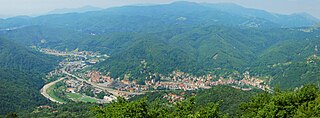
Ronco Scrivia is a comune (municipality) in the Metropolitan City of Genoa in the Italian region Liguria, located about 20 kilometres (12 mi) north of Genoa.

San Colombano Certenoli is a comune (municipality) in the Metropolitan City of Genoa in the Italian region Liguria, located about 30 kilometres (19 mi) east of Genoa. It is the largest municipality in the Val Fontanabuona.

Santa Margherita Ligure is a comune (municipality) in the Metropolitan City of Genoa in the Italian region Liguria, located about 35 kilometres (22 mi) southeast of Genoa, in the area traditionally known as Tigullio. It has a port, used for both tourism and fishing activities. Part of comune territory is included in the Regional Natural Park of Portofino. Santa Margherita Ligure borders the following municipalities: Camogli, Portofino, Rapallo.

Torriglia is a comune (municipality) in the Metropolitan City of Genoa in the Italian region Liguria, located in the upper Trebbia valley, about 20 kilometres (12 mi) northeast of Genoa. Torriglia borders the following municipalities: Davagna, Lorsica, Lumarzo, Mocònesi, Montebruno, Montoggio, Neirone, Propata, Rondanina, Valbrevenna.

Tribogna is a comune (municipality) in the Metropolitan City of Genoa in the Italian region Liguria, located about 33 kilometres (21 mi) east of Genoa.

Beverino is a comune (municipality) of c. 2,000 inhabitants in the province of La Spezia in the Italian region Liguria, located about 70 kilometres (43 mi) southeast of Genoa and about 11 kilometres (7 mi) north of La Spezia. It is part of the Vara river and of the Regional natural Park of Montemarcello-Magra.

Rapallo railway station serves the town and comune of Rapallo, in the Liguria region, northwestern Italy. Opened in 1868, it forms part of the Pisa–La Spezia–Genoa railway, and is situated between La Spezia and Genoa.

San Pietro di Rovereto is a village in Italy that lies on a ridge that descends to the Mediterranean Sea overlooking the Tigullio Gulf and the Promontory of Portofino, Liguria on the picturesque Italian Riviera. San Pietro is located in the municipality of Zoagli, within the province of Genova, Liguria region, and located approximately 40 kilometers Southeast of Genoa and situated between Rapallo and Portofino to the West and Chiavari to the East.

Genoa is a city in and the capital of the Italian region of Liguria, and the sixth-largest city in Italy. In 2023, 558,745 people lived within the city's administrative limits. While its metropolitan city has 813,626 inhabitants, more than 1.5 million people live in the wider metropolitan area stretching along the Italian Riviera.
